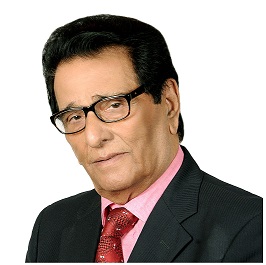An organization is the collective name of people working together for a common goal. It is the people behavior that determines the productivity and therefore the profitability of organizations. People behavior therefore is the NUCLEUS around which the whole activity of an organization revolves and is shaped.
Behavior is the reflection of one's attitudes. Attitudes are formed by one's experiences, beliefs and values. People behaviors are, therefore, molded by their experiences, values, opinions and views collectively termed as attitudes. People are hired for aptitudes but fired for attitudes.
A senior executive of an American firm once remarked I would love my job if it weren't for the peoples. Most of the organizations are plagued by PEOPLE PROBLEMS. These problems are shown in their behaviors. Why people behave the way they do, has, therefore, been the concern of all organizations and it has led to the study of BEHAVIORAL SCIENCE. One of the proponents of this Science was Dr. Eric Berne. As propounded by him every person has three Behavioral Characteristics known as Parent, Adult and Child. These Behavioral Characteristics are called Ego States which represent sets of Behaviors, Thoughts, Feelings and Attitudes.
The readings of:
1. GAMES PEOPLE PLAY by Dr. Eric Berne.
2. EVERYBODY WINS by Dorothy Jongeward and
3. I AM OK, YOU ARE OK? by Thomas and Amy Harris
Provide insight into the complexities of People Behaviors. Analysis of these behaviors throws clues as to why people behave the way they do and this is known as Transactional Analysis that Dr. Eric Berne advocated. Many organizations through out the world have turned to Behavioral Sciences for answers to People Problems. as it is the people who make or mar organizations. If the people are happy, they are more responsible and more effective, therefore they are more productive. Happy people contribute to the vitality and success of an organization.
It is not the job that frustrates as much as the Problems relating to People. As one Cost Analyst Complained, I thought my job would be dealing with figures, not people. What a surprise!
People have some basic beliefs about self and others. They use these beliefs to justify their decisions and behaviors. These behaviors are known as GAMES. Games are played wherever there are people.
This article, without a claim to originality, makes an attempt to:
? examine what prompts / motivates game - playing on the job.
? illustrate from experience how certain games are played in the organizational setting.
? demonstrate how games can be stopped.
What is a Game?
A Game is a transaction and a transaction is a communication between two or more people. It is an exchange of thoughts and of feelings expressed verbally or conveyed non-verbally (Tone, Pitch, Volume, Facial Expressions, Gestures and Postures).
What prompts Game - Playing in an Organization?
People play games because they have idle time. They need to fill up time. If they do not do it, they suffer boredom. Boredom saps physical and mental energies that causes deterioration. People who are bored with their jobs are more prone to Game - Playing.
People need recognition. It is a universal phenomenon. If the work environment is void of RECOGNITION people have all the more reasons and need to play games.
Motives and Effects.
Every game has a hidden agenda. There are hidden motives. Game players actually do not talk about what it sounds they are talking about. What they say, they do not mean; what they mean, they do not say. In the process someone gets hurt and the real problems remain unsolved. Such games prevent honest and open relationship and reveal that each person's real Hell.. is the other People.
Those who play games find other people to talk and to gossip and put other people down. By playing such games they are transmitting a message that they are OK but others are NOT OK. However in reality they may be having a belief that they are NOT OK. Therefore they feel better by putting others down.
Games are destructive. They cost the organization heavily. People who otherwise could be productive divert their energies into game-playing rather than doing their own job or getting the job done, making decisions or solving problems.
Games always fortify a feeling of I AM NOT OK and / or YOU ARE NOT OK. They lead to loss of productivity. The time of the organization which could have been used productively is used to reinforce negative concepts about self / others.
A few sample of Games played in Organizations.
? The following statements are often heard being made by employees.
? Well, I was only trying to help you.
? If it weren't for the Training Manager we could have run this training program well in time.
? It baffles me why such weird things always happen to me.
? This is the fourth time she has messed up the job for us.
Such statements aim at finding fault with others. When people play such games they do things like passing the buck. Such games are known as Blaming Games or Passing the Buck games. People who play these Games present themselves as angels and blemish-less by placing the responsibility for their short comings on some one else.
In an office setting someone senior or someone junior is blamed for their own mistakes
Such people find themselves inadequate and the blame is put on others for their inability / incompetence to achieve.
Another Blaming Game played is I have got you . In this game someone ends up being caught for having made a mistake. The game player arranges a set up for someone to make mistakes and when the mistakes occur the player shouts at him, gets angry at him. A Manager / Supervisor who gives incomplete instructions can be setting up such a game.
A game usually played between staff and line managers is but why don't you It is a game to put people down.
See what you made me do is a very common statement made by people in the organization. It is to blame a mistake made by the game player in the presence of another person on that other person.
Such a person takes the position nothing is ever my fault, but it is yours. Such a person is the collector of angry feelings about others and feelings of inadequacy about self.
The words "if it weren't for----" may be a clue to the possibility of game playing rather than an honest complaint. " If it weren't for such a rigid organization policy we could be creative" suggest the employees are playing a game, as they are actually not sure of their own creative abilities.
In office one finds a nit-picker. The game office nit-picker plays is to point out mistakes that are small and of no consequence. The people picked on can become angry and resentful.
A game where a bait is thrown in a manner that a trap falls on an employee who may then have to decide whether to stick with the organization or to seek employment elsewhere. Some organizations, in their desire to attract bright students in the college campus, paint a very rosy picture of the position they are offering. When they join, the realization comes that the position is not that was projected to be; and they feel trapped.
Another dirty game is where one person goes to a second person in an attempt to engage the second and the third person in an argument. It proceeds like this.
One employee A goes to another employee B saying in confidence ?It makes me feel uncomfortable to tell you this but I thought it over and feel you need to know what C is saying about you. And then the person proceeds to reveal, distort or fabricate what C is saying. In all likelihood B will soon engage in a conflict with C
In office one finds a corner player. Who maneuvers other people into a situation where they remark ?It seems, whatever we do, we never come out right, no matter what ever we do we can't please the boss. Such a feeling is typical of one who feels cornered.
The games described above are my own personal experiences / observations and are but a few of the variety of games played in an organization. These games are classified by Behavioral Scientists under different names like Blaming, Under Cutting, Putting other people down, Bear Trapping etc.
However whatever may be the type and nature of games played, they ultimately vitiate the work place environment, prevent development of honest and open relationship, and inhibit problem solving, curb creativity and productivity, put fetter on authentic interactions and cause anger and resentment among employees.
How Games can be stopped
? Games always aim at undermining other people. What is required is to develop and nurture those management skills that would help create such ambience at the work place as would make other people seem Heavenly. Insight into one's own personality and into what makes other people tick or click can probably lead to creation of that Heavenly ambience and those moments when other people seem Heavenly and feel Heavenly.
? When game-playing is stopped or curtailed within the organizations, it paves the way for more open, honest and authentic interactions among employees. It saves time and money. Moreover Curtailing / Preventing of organizational games helps people to be creative and productive.
? Managers who take the stance YOU ARE NOT OK tend to stall the personal growth and development of employees they manage. Managers can change this position. With persistence and enough foresight games can be stopped before they start. Efforts should be made to stop putting others down and putting ourselves down. In other words we should refrain from defining others as insignificant, refrain from collecting negative feelings about ourselves and stop exaggerating personal shortcomings. It will help stop game - playing.
? There are many ways in which management can diminish if not fully eliminate the time invested in games. This can be done by :
- reducing boredom on the job,
- Enriching work environment.
- allowing people to express and develop their own Potential.
- Integrating the personal goals with the Organizational goals.
It is to the benefit of organizations, if employees are given freedom to channel their energies into solving problems, making decisions and developing their talents and potentials. Happy employees contribute to the productivity that leads to increasing profits.
We managers need to create work environment that provides conducive conditions to employees to use their time productively and effectively. Less idle time they have, less scope is there for them to play games. Attitudes can be changed if the organizational Climate / Culture provide empowerment and professional freedom to employees to develop their potentials. Management can do that by fostering the attitude, WE (MANAGEMENT) ARE OK; YOU (EMPLOYEES) ARE OK?. This in all probability will help utilize the full potential of all its employees and create a Win Win situation.

 Create and manage your profile
Create and manage your profile Refer an author and get bonus Learn more
Refer an author and get bonus Learn more Publish any lost and found belongings
Publish any lost and found belongings Connect with the authors & add your review comments
Connect with the authors & add your review comments Join us for Free to advertise for your business or
Contact-us for more details
Join us for Free to advertise for your business or
Contact-us for more details
 Join us for Free to publish your own blogs, articles or tutorials and get your
Benefits
Join us for Free to publish your own blogs, articles or tutorials and get your
Benefits


 1 like
1 like


